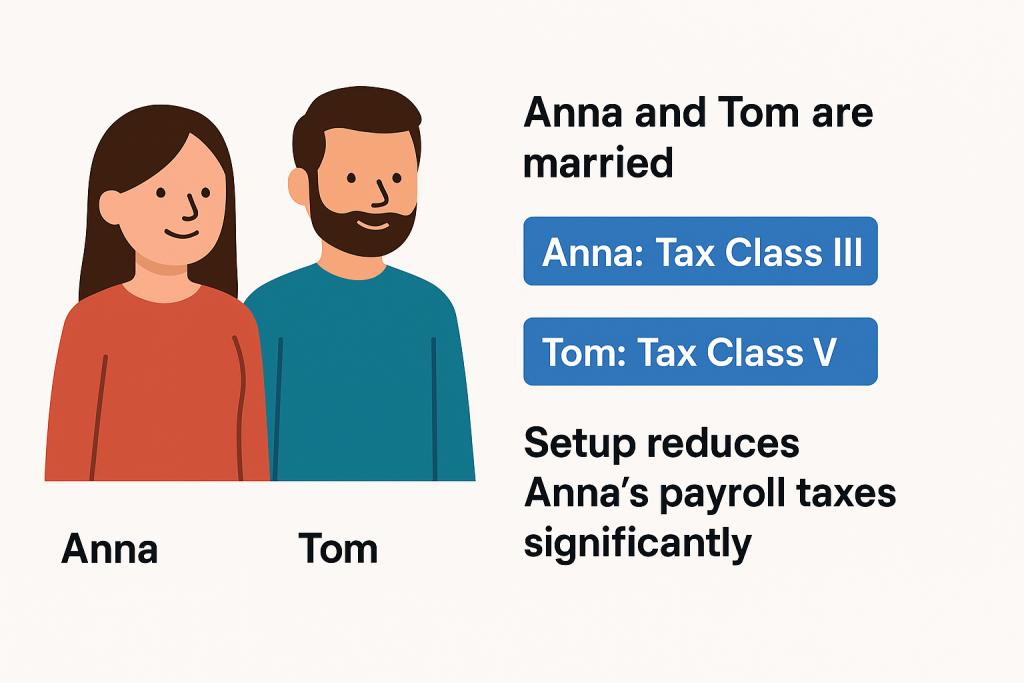What are German Tax Classes (Steuerklassen)?
If you’ve just moved to Germany and started working, you might have already come across the term “Steuerklasse” – your tax class. It’s one of the most important factors that influences how much income tax you pay every month. But don’t worry — while the German tax system can seem intimidating at first, understanding tax classes is easier than you think.
Germany uses a progressive income tax system — the more you earn, the higher the percentage you pay. But before the government calculates your tax, they look at your Steuerklasse, or tax class, which determines your monthly payroll deductions (wage tax or “Lohnsteuer”).
There are six German Tax Classes in total. Each one reflects your marital status, dependents, and secondary income. You can find the tax classes in the German Income Tax Law — Einkommensteuergesetz: § 38b EStG.
The 6 German Tax Classes – Explained
| Tax Class | Who It Applies To |
|---|---|
| I | Single, divorced, or widowed individuals without children |
| II | Single parents (with entitlement to child benefits) |
| III | Married person – if the partner has very low or no income (partner will then be in Class V) |
| IV | Married couples where both partners earn similar incomes |
| V | Married person – if the partner is in Class III (usually the one earning less) |
| VI | For people with more than one job (applies to the second job) |
Why Does Tax Class Matter?
Your tax class determines how much tax is withheld from your monthly gross salary. It doesn’t affect your total annual tax liability, but it has a big impact on your take-home pay. For example:
- A Class III taxpayer might see significantly higher net pay than someone in Class I — even if they earn the same.
- A Class VI taxpayer pays more tax upfront on secondary jobs, which they might reclaim later through a tax return.
Can I Change My Tax Class?
Yes — under certain conditions. For example:
- Married couples can switch between Class IV/IV and III/V, depending on who earns more.
- Divorce or separation means switching to Class I or II (if you have kids).
- Changes can be made once a year via your local Finanzamt or online using the Elster portal or via your tax consultant.
Some couples also choose to switch tax classes based on expected tax refunds or childcare benefits (“Elterngeld”).
Real-Life Example
Anna and Tom are married.
Anna earns €60,000/year, while Tom is a freelancer with variable income.
They choose:
- Anna: Tax Class III
- Tom: Tax Class V
This setup reduces Anna’s payroll taxes significantly. At year-end, they’ll file a joint tax return to balance everything out.

Common Questions from Expats
Do I need to file a tax return if I have only one job?
Not always — but you might get a refund if too much tax was withheld. Worth checking!
I just got married in Germany. Will my tax class update automatically?
No — you have to apply for a class change at the tax office.
Can I choose my tax class when I register?
Not directly. You’re automatically placed into a class based on your registration and marital status — but you can change it later.
Quick Tips for Expats
Always check your tax class on your Lohnsteuerbescheinigung (your annual payslip).
Use a German Tax Classes calculator online to estimate your take-home pay.
If you’re unsure which combination is best (especially as a couple), talk to a tax advisor (“Steuerberater”) — the difference in tax refunds can be substantial.
Filing your annual tax return (“Einkommensteuererklärung”) is the only way to get any overpaid taxes back.
How to continue / contact to us
We as english speaking tax advisors who can advise you about Understanding German Tax Classes and communicate with the financial authority on your behalf.
You can contact us by using one of these phone numbers or the mail address.
